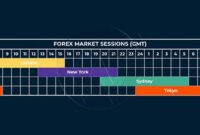Day trading, the practice of buying and selling financial instruments within the same trading day, requires careful consideration of the chosen market. The foreign exchange (forex) and stock markets offer distinct characteristics that cater to different trading styles and risk tolerances. Selecting the right market is crucial for maximizing profit potential and minimizing losses. This article analyzes the critical differences between these two popular day trading avenues to assist traders in making informed decisions.
Volatility
Forex markets are known for their high volatility, offering significant profit opportunities but also increased risk. Stock market volatility is generally lower, providing a more stable but potentially less lucrative environment.
Liquidity
The forex market boasts exceptional liquidity, ensuring ease of entry and exit with minimal slippage. While many stocks offer high liquidity, less traded stocks can present challenges for day traders.
Trading Hours
Forex trading operates 24 hours a day, five days a week, offering flexibility for traders across different time zones. Stock markets have specific trading hours, limiting access for some traders.
Leverage
Forex trading typically involves higher leverage than stock trading, magnifying both profits and losses. Traders must carefully manage leverage to avoid significant losses.
Regulation
Regulatory oversight varies across both markets depending on the specific broker and jurisdiction. Traders should ensure they operate within a regulated environment to protect their investments.
Cost of Trading
Forex trading costs primarily involve spreads and commissions, which can vary between brokers. Stock trading costs often include commissions and fees, impacting overall profitability.
Market Analysis
Both markets rely on fundamental and technical analysis, but the specific factors driving price movements differ. Forex traders focus on macroeconomic factors, while stock traders analyze company performance and industry trends.
Learning Curve
Both markets require dedicated learning and practice to achieve consistent profitability. The complexity of each market can vary, influencing the time required to develop effective trading strategies.
Tips for Choosing the Right Market
Risk Tolerance: Assess your comfort level with risk. Higher risk tolerance may align with the forex market’s volatility, while lower risk tolerance may favor the relative stability of stocks.
Trading Style: Consider your preferred trading strategies. Scalpers and momentum traders may find the forex market’s volatility advantageous, while value investors may prefer the stock market.
Time Commitment: Evaluate the time you can dedicate to trading. The 24/5 availability of forex may suit traders with flexible schedules, while stock market hours may be more restrictive.
Capital: Determine your available trading capital. Lower capital requirements and high leverage in forex can be attractive, but also increase risk. Stock trading may require higher initial capital.
Frequently Asked Questions
What are the key differences in market hours between forex and stocks?
Forex markets are open 24/5, while stock markets operate during specific exchange hours.
How does leverage impact day trading in each market?
Higher leverage in forex amplifies both profits and losses, while lower leverage in stocks offers less risk but potentially smaller returns.
Which market is more suitable for beginners?
Neither market is inherently easier. Both require dedicated learning and practice. The choice depends on individual learning style and risk tolerance.
What are the primary costs associated with day trading in each market?
Forex trading costs mainly include spreads and commissions. Stock trading costs often involve commissions and fees.
What analysis methods are commonly used in each market?
Both markets use fundamental and technical analysis, but focus on different factors. Forex emphasizes macroeconomic indicators, while stocks focus on company performance and industry trends.
How does liquidity affect day trading execution?
High liquidity ensures efficient trade execution with minimal slippage, crucial for day trading strategies. Forex generally offers higher liquidity than many stocks.
Ultimately, the best market for day trading depends on individual circumstances, trading style, and risk tolerance. Careful consideration of the factors discussed above will empower traders to make informed decisions and maximize their potential for success.



